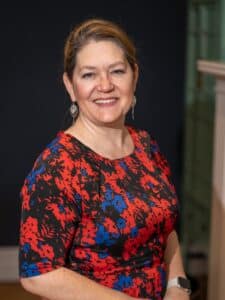Women are a minority among angel investors, representing just 14 per cent of the 36,800 in the UK, according to data from the UK Business Angels Association (UKBAA). But what are the reasons and remedies for this imbalance? And why does it matter?
A number of initiatives, such as the Women Backing Women campaign, have been launched in recent years to encourage more women to consider angel investing and increase the flow of investment into female-led businesses.
With one of the largest and most active angel networks in the UK, Oxford Innovation Finance is a proud signatory of the Investing in Women Code and has helped a diverse range of female-led businesses across the country to secure investment. Many of which are developing game-changing solutions to tackle global challenges. For example, Albotherm, Learning with Experts, FA Bio and StudyHall to name just a few.
So, why does the UK have far fewer female angel investors and why is diversity important? We spoke to three female investors in our own network, Oxford Investment Opportunity Network (OION), to discuss the reasons they became angel investors and obtain their views on the gender gap in the UK’s angel investment landscape.
Caroline McGuirk

Why did you become an angel investor?
My first job out of university was for a private equity-owned business, so I saw what it was like from the other end of the spectrum first. I later went on to work in venture capital and I spent more and more time in the investment world, and became an investor. Every company has to start somewhere. I’m really interested in, and admire, the people who have the courage to start a business.
What is the most rewarding thing about being an angel investor?
When things go well, its obviously financially rewarding, but it is also fantastic to watch a business founder grow into a leader and CEO. With early stage businesses, it is very people centric. It is very much about the early team, their story and journey.
What do you look for in a potential investment opportunity?
I look for three things, initially. Firstly, I look at the founder of a business. For me, I think a founder needs to be unapologetically ambitious and driven as the challenges and set-backs in growing a business are numerous. You’ve got to believe that they have what it takes to get the business to the lead investment stage, where they will have a board put in place around them. Secondly, I look at whether the business has the ability to attract and retain talent. Finally, and most obviously, its about the idea. You have to believe there is a significant market opportunity for the idea to return an investment.
According to a report by UKBAA, just 14% of angel investors in the UK are women. Why do you think there are fewer female angel investors in the UK?
Often angel investors are exited CEOs or people who have worked in the investment landscape, and in both cases women are in the minority. So, more women working in the investment community or becoming CEOs, could lead to a rise in female angels.
Women generally have less appetite for risk than men. For example, in the hedge fund industry there are fewer female fund managers. But the landscape is slowly changing. Plus, many women are now the main bread-winners in their families and with each generation, they have more and more assets, which increases the likelihood of more women becoming angel investors in the future.
Why do you think diversity is important in the investment landscape?
When recruiting, people generally hire in their comfort zone, which means they hire similar characteristics to themselves. To some extent, it is likely that the same is true when it comes to investing. Therefore, having greater diversity in an investor base – in terms of experience, background, gender, location etc – is so valuable.
Why did you decide to become a member of Oxford Innovation Finance’s Oxford Investment Opportunity Network (OION Ltd)?
OION is a very valuable group, which connects investors with a great mix of very high quality businesses seeking investment. I think it is really important for an angel group to have investors from different industries, who have different experiences and opinions to bring to the mix, and OION is particularly strong on that.
Anna Salim

Why did you become an angel investor?
I’ve spent nearly a decade in private equity and venture capital and have been personally investing in the US tech sector for over 15 years. Angel investing was a natural progression, allowing me to apply my experience to earlier-stage businesses. I’ve always been fascinated by how companies are built and scaled, and as an angel investor, I can play an active role in supporting and mentoring founders.
What is the most rewarding thing about being an angel investor?
Small companies are the backbone of the economy – creating jobs, driving innovation and generating economic growth. As an angel investor, you get to witness a company’s growth journey, offering mentorship, strategic guidance and network access along the way. Angel investing is also a great way to connect with people from diverse industries and exchange knowledge with other investors. By joining an angel network, you become part of a collaborative community that helps promising businesses succeed while expanding your own expertise and perspective.
What do you look for in a potential investment opportunity?
I evaluate opportunities from multiple lenses. When I first meet a founder or team, I focus on assessing their capabilities and personal attributes – such as resilience, transparency in discussing both challenges and opportunities, integrity and communication skills. A great founder is confident, but also willing to listen, absorb knowledge, and compound as a leader.
Beyond that, I look for a strong commercial mindset. Founders should approach every business decision with a clear focus on long-term value creation and sustainable growth.
Why do you think there are fewer female angel investors in the UK?
Women often evaluate risk differently from men, taking a more considered, long-term approach to investment. In my view this is a strength, but it may also mean fewer women feel comfortable taking the first step into angel investing. Angel networks have a key role to play in raising awareness of the process and benefits, making it more accessible to a wider range of people.
I’d encourage women considering angel investing to talk to other investors and see what it is like first-hand. The best way to develop as an investor is to become one. You just have to take that first step!
Why do you think diversity is important in the investment landscape?
Diversity goes beyond just gender. It is about diversity of perspectives, backgrounds, industries and geographies. It’s important to have both investors and founders from a broad range of backgrounds, as this brings fresh insights and a wider range of experiences to the discussion. Having lived and worked in three different countries, I’ve been exposed to different cultures, markets and ways of thinking. That experience is a real asset when evaluating businesses.
For women considering angel investing, I’d encourage you to get involved. Your experience, perspective, and network can make a real difference, not just to the businesses you invest in, but to the broader ecosystem. The more diverse voices we have at the table, the stronger and more inclusive the investment landscape becomes.
Why did you decide to become a member of Oxford Innovation Finance’s Oxford Investment Opportunity Network (OION Ltd)?
I joined OION to expand my investment track record in early stage businesses beyond my professional investment career. Currently, I’m pursuing a postgraduate Diploma in AI for Business at Saïd Business School, and want to engage more actively with the opportunities emerging from Oxford, particularly in AI applications. OION provides access to high calibre start-ups and a strong network of angels. The showcase events are well organized and the pitches are high quality, making it an excellent platform for discovering and supporting promising startups.
Sara Boltman

Why did you become an angel investor?
I was introduced to angel investing two years ago by someone who was setting up a women’s angel network in Wales and I undertook the UKBAA’s introductory training course. I wanted to invest in women-led businesses, but I also wanted to support spin-outs from my old university in Oxford, so I decided to additionally join Oxford Innovation Finance’s angel network. Being a member of two groups is beneficial because there is cross-pollination, they have different styles and have access to different businesses.
What is the most rewarding thing about being an angel investor?
It is exciting to see new start-ups grow and succeed, and rewarding to give something back. It is also about making it slightly easier for the next generation of female entrepreneurs. I set-up my own company, Butterfly Data, 21 years ago and it now has 33 employees and a solid track record of delivering public sector data projects. I never raised investment for my own business, but I look back and think maybe I missed out on the advice and connections that an investor may have brought to my business.
What do you look for in a potential investment opportunity?
I’m a data person, so I’m looking for more than just a well presented story from a founder. I like to invest in businesses in sectors that I know something about as I can add value and ask the right questions. I also want my investments to help make a difference, so I’m particularly interested in green technology, solutions to environmental issues, healthcare and gender equality. I want to invest in businesses that are likely to give a good return on investment but are purpose-driven.
Why do you think there are fewer female angel investors in the UK?
Most angels tend to be exited founders or semi-exited CEOs. There are less female CEOs and less exited female founders, so there are less female angels. I also think for women investing feels riskier and their reasons for investing are sometimes quite different from men. Women seem to feel happier being mentors to business founders, but less confident about investing. By mentoring first, they then feel more comfortable in writing a cheque and investing as it seems like a natural next step.
I didn’t start angel investing until my mid-40s, but I would suggest starting earlier with small investments to build your portfolio and experience. I don’t think you need to wait until you’ve fully exited your own business before becoming an investor. There’s an advantage of still being active in industry as you can add more value to a business, than just finance, by leveraging your contacts and network.
Why do you think diversity is important in the investment landscape?
Diversity is important in terms of experience and background as well gender. Having a group of angel investors with a broad range of skills and experience is much more powerful as people have different views and ask different questions. You can learn from different investors from different sectors. Some of the people with the best ideas out there might not come from an entrepreneurial background or have business role models to guide them.
Why did you decide to become a member of Oxford Innovation Finance’s Oxford Investment Opportunity Network (OION Ltd)?
Being a graduate of Oxford University, I wanted to support spin-outs from Oxford. OION is a very well-established angel group. It has a great deal flow and a high calibre of businesses.
Becoming an Angel Investor – 21st May 2025
Have you considered becoming an angel investor? Or are you an investor looking to build a more diverse portfolio? Oxford Innovation Finance is hosting a free event on Becoming an Angel Investor on 21 May 2025, 2pm-5pm, at Saïd Business School in Oxford, in partnership with the UK Business Angels Association and British Business Bank. This is a great opportunity for would-be angels to network, learn and gain practical insights from experienced angel investors, industry experts and business founders.
You can register here for this free event.


